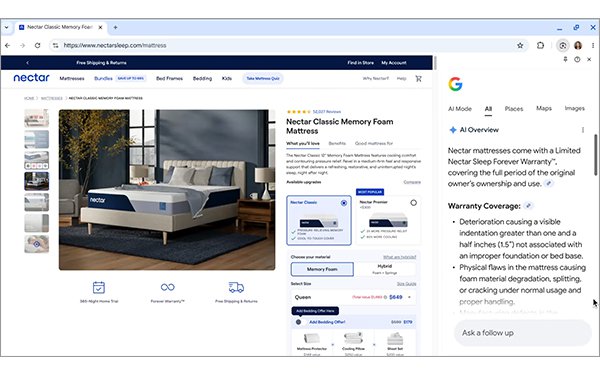
Google is adding agentic capabilities to Gemini in Chrome,
allowing artificial intelligence (AI) to perform all types of tasks for users. The feature is part of many advanced updates for its browser announced Thursday.
Agentic AI allows users to
delegate tasks such as booking a haircut or ordering groceries, but safeguards have been put in place so humans can stop the task at any time.
For tasks like ordering a sandwich, the
agentic assistant can add items to a cart and wait for the consumer's approval at checkout.
Agentic AI uses Gemini to act on information, automating multi-step processes, Mike Torres,
vice president of product at Google Chrome, explains in a blog post. Today's announcement represents the biggest upgrade to the browser in its history, he wrote.
The updates deepen the
integration of Gemini into Chrome, allowing users also to ask complex, multi-part questions from the same location from which they browse the web.
advertisement
advertisement
They can ask questions about the page they
are on directly in the search bar, or in the omnibox, a modern type of search bar that combines functions of a traditional address bar and a search bar into one unified field. This
provides an AI-generated overview and allows for follow-up questions and deeper research.
Advancements in Gemini enable the AI to analyze information across multiple open tabs. For example, a user could compare hotel options from different websites or summarize and organize
information for a trip and restaurants. The technology can consolidate the information into one itinerary.
New protections were put in place like Gemini Nano to detect and protect
against AI-generated scams such as fake virus alerts and phishing attempts. Chrome will also add a one-click option to fix compromised passwords.
New capabilities include deeper
integration with other Google apps such as Calendar, YouTube, and Maps. It is all done through a deeper integration between Gemini in Chrome and Google apps.
Users can schedule meetings, see
location details and more without leaving the page they are on. For example, when someone looks a specific spot in a YouTube video, they can ask Gemini in Chrome and it will take them there
immediately.
The feature allows users to ask follow-up questions to explore more content from across the web. It initially rolls out in Mac and Windows desktop users in the U.S. later
this month and will expand to more countries and languages in the weeks ahead.
Gemini in Chrome becomes available to businesses in the coming weeks via Google Workspace with
enterprise-grade data protection and controls. Gemini in Chrome also will be made available for mobile devices in the U.S.
Activation using Chrome on Android and other apps, is made
available by holding the power button, and Apple iOS Gemini in Chrome will then be built into the app.
Google competitors have begun to do the same. For example, Microsoft has integrated
its Copilot AI into Edge, offering a conversational AI that can answer questions, summarize pages, and compare information across tabs -- but from available information that Chrome has made a variety
of advancements in that Microsoft has not.
Brave also has integrated its Leo AI assistant into its browser, which summarizes text and performs translations without retaining
personal data or IP addresses.
OpenAI reportedly is developing its own browser, and is expected to offer agentic intelligence and task-completion capabilities.
There are many other features in various stages of development.